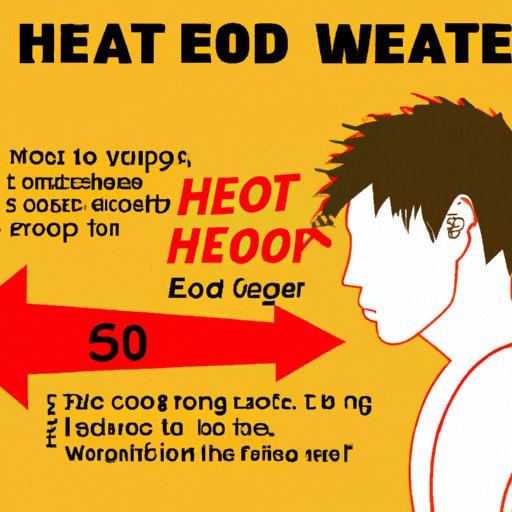
Introduction
Heat exhaustion is a potentially dangerous condition that can occur when your body overheats due to hot and humid weather, strenuous physical activity, or dehydration. It can lead to serious complications if left untreated, but it is preventable if you know how to recognize the symptoms. In this article, we will discuss the warning signs and symptoms of heat exhaustion, the importance of recognizing them, and how to stay cool and safe in hot weather.
How to Recognize the Warning Signs of Heat Exhaustion
Recognizing the warning signs of heat exhaustion is crucial because it can help you take action before your condition worsens. The warning signs include:
- Heavy sweating
- Feeling weak or dizzy
- Headache
- Nausea or vomiting
- Fainting
- Fast and shallow breathing
- Fast and weak pulse
- Muscle cramps
- Pale or clammy skin
- Confusion or disorientation
If you experience any of these warning signs, it’s important to take action right away to prevent your condition from worsening.
10 Symptoms of Heat Exhaustion You Need to Know
There are ten main symptoms of heat exhaustion that you need to know:
- Heavy sweating
- Feeling faint or weak
- Nausea or vomiting
- Headache
- Muscle cramps
- Fast and shallow breathing
- Fast and weak pulse
- Pale or clammy skin
- Confusion or disorientation
- Dark urine (a sign of dehydration)
If you experience any of these symptoms, it’s important to seek medical attention or take steps to cool down and hydrate yourself.
From Nausea to Dizziness: A Complete List of Heat Exhaustion Symptoms
In addition to the ten main symptoms previously mentioned, there are several less common symptoms that you should be aware of, including:
- Visual disturbances, such as blurred vision
- Difficulty speaking or slurred speech
- Fatigue or exhaustion
- Weakness or lack of coordination
- Increased heart rate (tachycardia)
- Fainting or loss of consciousness
- Seizures or convulsions (in severe cases)
It’s essential to be aware of all possible symptoms of heat exhaustion since everyone experiences it differently. Knowing these signs can help you recognize heat exhaustion, take action to treat it, and prevent more severe complications.
Don’t Ignore These Signs of Heat Exhaustion: Your Body is Trying to Tell You Something
Ignoring the signs and symptoms of heat exhaustion can be dangerous. Your body is trying to tell you that it’s overheating, and if you don’t take action, it can quickly lead to heatstroke, which is a medical emergency. The symptoms of heatstroke include high fever, dry skin, confusion, seizures, and loss of consciousness.
It’s essential to listen to your body and take action right away if you experience any of the symptoms of heat exhaustion. This may include taking a break in a cool, shaded area, drinking water or sports drinks, and removing any tight or heavy clothing.
The Surprising Symptoms of Heat Exhaustion You Might Not Expect
Some less common yet surprising symptoms of heat exhaustion include:
- Chills or goosebumps
- Heat rash or prickly heat
- Dehydration
- Low blood pressure (hypotension)
- Increased sensitivity to the sun (photosensitivity)
- Stomach cramps or diarrhea
It’s essential to recognize that not everyone experiences heat exhaustion the same way, and some people may have atypical symptoms. By being aware of these symptoms, you can take action to prevent your condition from worsening.
Staying Cool and Safe: Understanding the Symptoms of Heat Exhaustion
There are many ways to prevent heat exhaustion, such as:
- Staying hydrated by drinking plenty of water or sports drinks
- Avoiding alcohol and caffeine
- Wearing lightweight, loose-fitting clothing
- Staying in shaded areas or air-conditioned buildings
- Taking frequent breaks if working or exercising outdoors
It’s essential to be familiar with the symptoms of heat exhaustion, how to recognize them, and how to take action to prevent your condition from worsening. By following these preventive measures, you can stay safe and enjoy the hot weather without the risk of heat exhaustion.
Conclusion
Heat exhaustion is a serious condition that can lead to severe complications if not recognized and treated promptly. Recognizing the warning signs and symptoms of heat exhaustion is vital to prevent your condition from worsening, and taking action to prevent it is essential. By staying hydrated, wearing appropriate clothing, and taking breaks in the shade, you can stay safe and cool in hot weather. Remember, when it comes to heat exhaustion, prevention is key.





